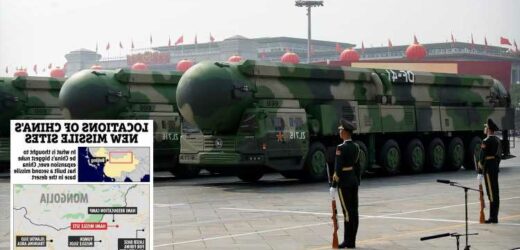CHINA has launched what is thought to be its biggest nuclear expansion ever as it builds a second missile base in the desert.
In the desert, 1,200 miles west of Beijing, the Chinese government is digging a new field of what look to be 110 silos for launching nuclear missiles – the second such field discovered by analysts surveying commercial satellite images in recent weeks.
It is believed to signify a vast expansion of China’s nuclear arsenal after the Washington Post last month reported Beijing is building more than 100 additional missile silos in the country's northwestern Gansu province.
According to new reports from the New York Times, the new silos appear to be deliberately being built to be visible, as a form of a threat to the west.
Construction on the most recent silo field began in March, in the eastern part of the Xinjiang region, not far from one of China’s notorious “re-education” camps in the city of Hami.
Nuclear experts at the Federation of American Scientists picked it up using images from a fleet of Planet Labs satellites last week.
These silos can hold China's newest nuclear-armed missile, the DF-41.
Reports also say underground bunkers are being built to function as launch centers, with trenches carrying cables to 10 different silo launchers.
While China has historically cast itself as occupying something of a moral high ground, avoiding expensive and dangerous arms races, this appears to be changing under President Xi Jinping.
At the same time that China is cracking down on dissent at home and asserting new control over Hong Kong, it is also headed into new territory with nuclear weapons.
In a study of the new silo field, Matt Korda and Hans M. Kristensen wrote: “The silo construction at Yumen and Hami constitutes the most significant expansion of the Chinese nuclear arsenal ever”.
China has operated about 20 silos for big, liquid-fuel missiles called the DF-5 for decades, they noted. However, the newly discovered field, combined with one hundreds of miles away in Yumen, would give the country roughly 230 new silos.
“The silo construction at Yumen and Hami constitutes the most significant expansion of the Chinese nuclear arsenal ever”.
The country’s rapid expansion of its arsenal has left analysts debating the reasons behind it, as well as the best course of action from the United States.
There were several theories around the change in tack – the simplest was that China wanted an arsenal to match its economic, technological and military superpower.
Another was that China was concerned about American missile defenses, as well as India’s nuclear buildup and deadly new weapons built by Russia.
There were also thoughts that China was worried that its few ground-based missiles were vulnerable to attack, and that by building more than 200 silos, spread out in two locations, they could play games with the US, forcing officials to guess where they are.
China could, sooner or later, be drawn into arms control negotiations with the United States and Russia, with US officials reportedly having previously asked Beijing for transparency.
At the end of the Trump administration, Secretary of State Mike Pompeo and his arms control envoy, Marshall Billingslea wrote that “we’ve asked Beijing to join both nations in the United States and Russia in crafting a new arms control agreement covering all categories of nuclear weapons”.
News of the latest expansion comes as one of Australia's top military figures has given a grave warning of the threat China poses to the nation.
Speaking to 4BC on Tuesday, former major general of the Australian Army and current Liberal senator Jim Molan said war was "more likely" than most people were prepared to admit.
“China and national security are the most dangerous issue for us.”
The former general also warned against the assumption that America would protect Australia from China, stressing the US army was weaker than most realised.
However, James M. Acton, co-director of the Nuclear Policy Program at the Carnegie Endowment for International Peace, has argued that there are many reasons why the expansion is no cause to panic.
He wrote in an op-ed for the Washington Post that some of the new silos are likely to be decoys with no missiles.
“China has built a vast network of tunnels to help hide, and therefore protect, its relatively small force of mobile ICBMs. In a similar vein, some of the new silos may be dummies, intended to complicate U.S. targeting plans,” Acton said.
“In fact, China may even plan to shuttle a small number of ICBMs among a much larger number of silos in a kind of 'shell game'."
This is an approach that had been adopted by the US during the Cold War when the Carter administration planned 4,600 silos to protect only 200 MX/Peacekeeper ICBMs, he explains.
Acton also cautioned that China’s motivation in building the silos is “important in developing an effective response.”
He adds that the US “is likely to retain a much larger nuclear arsenal than China” but that the US could head off a potential arms race by tracking fissile material – the plutonium and highly enriched uranium needed to produce nuclear weapons.
“China does not currently appear to be producing more fissile material, though there are concerns that it may restart,” he states.
Reports of the rapid expansion comes amid news China is building up a terrifying arsenal of weapons including hypersonic missiles that travel so fast they are impossible to stop.
The DF-17 can perform “extreme maneuver” as it moves at Mach 10 – some 7,600mph – towards a target, with a carrier unlikely to survive a direct hit.
Their sophisticated sensors, guidance systems, and innovative propulsion methods have been compared to building the atomic bomb.
Commander of US Strategic Command Charles A. Richard has warned that China’s nuclear arsenal could double, if not triple or quadruple, in the next decade.
Source: Read Full Article







